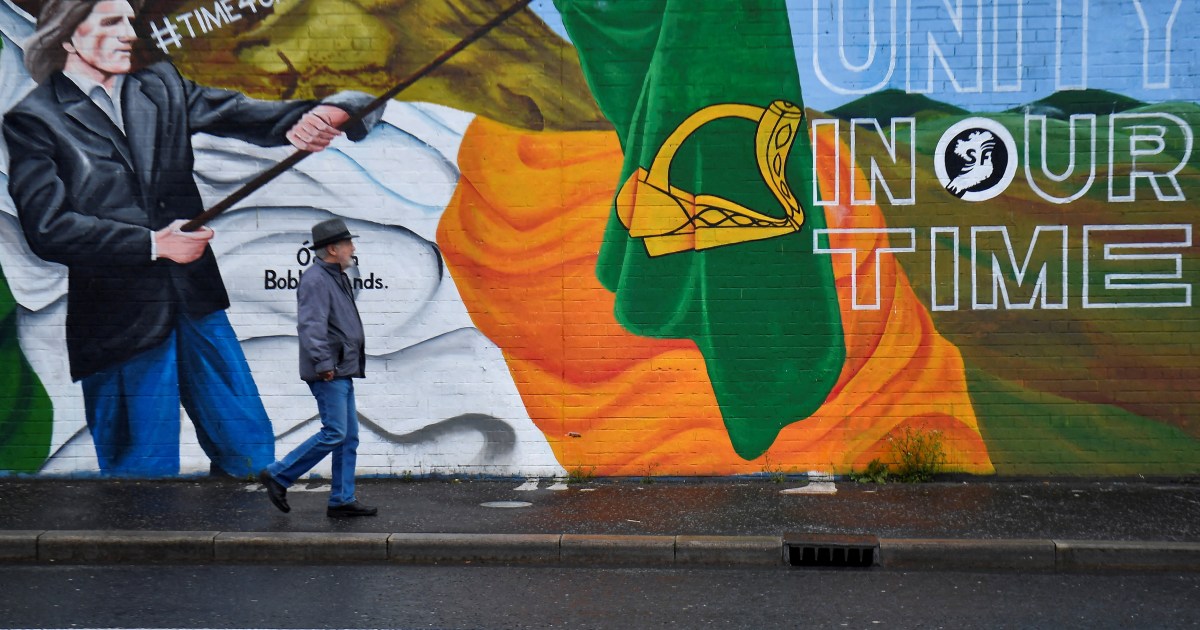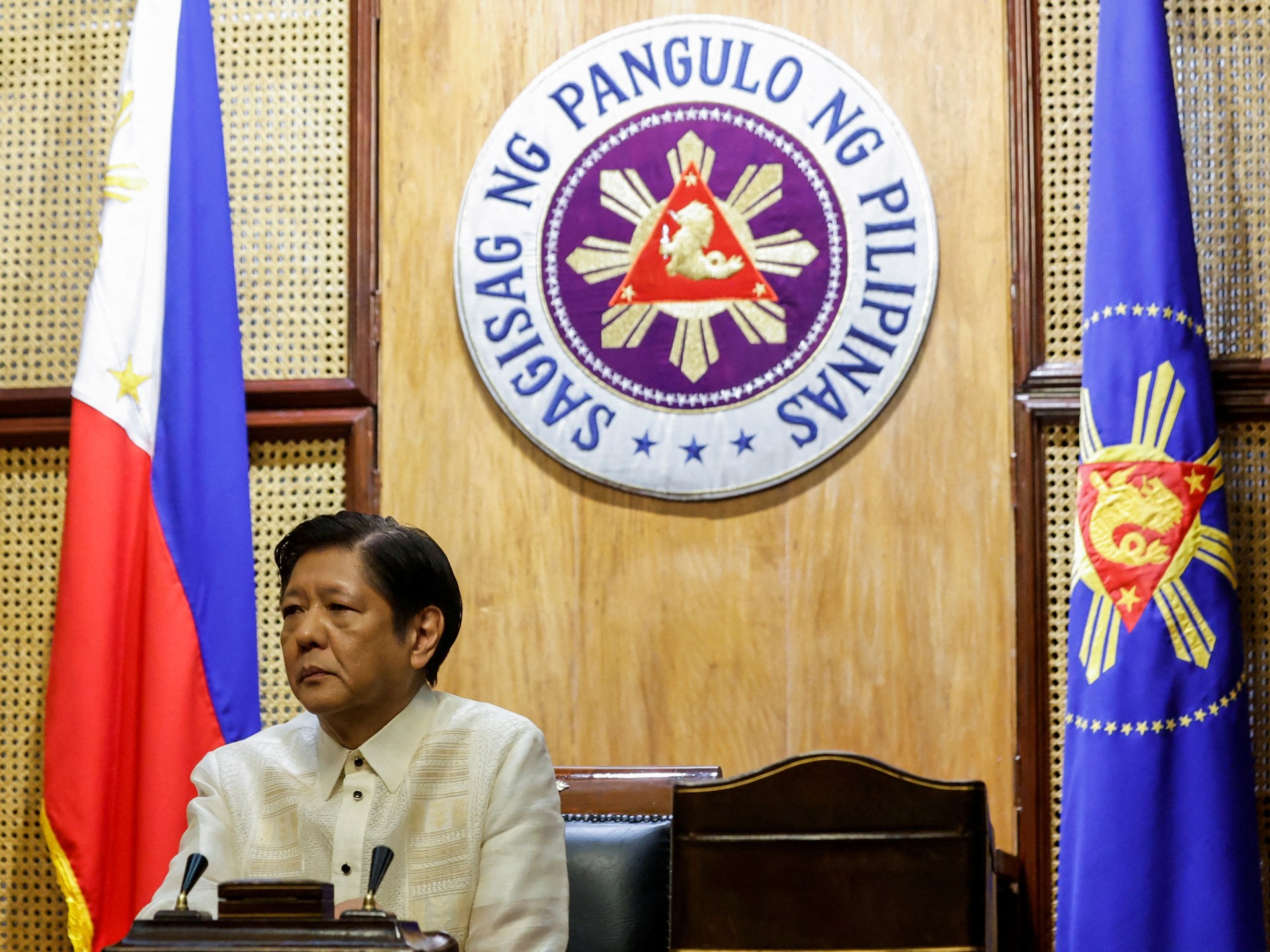Northern Ireland set to vote in election poised to make history
Belfast, United Kingdom – Voters in Northern Ireland are set to go to the polls on Thursday in an election that could make history.
This is because Sinn Féin, an Irish nationalist party that supports the reunification of Northern Ireland with the Republic of Ireland, is widely predicted to secure the majority of the votes and as such become entitled to the post of first minister.
It would be the first time in the history of the state that a nationalist has held this role instead of Unionist politicians, who favour Northern Ireland remaining part of the United Kingdom.
Northern Ireland was created in 1921, designed to have a permanent Unionist majority.
However, the majority has been on the decline for decades, and the two main unionist parties saw significant losses in the 2017 election.
This is partly due to changing demographics.
The results of the 2021 census due later this year are expected to show that the proportion of the population coming from a Catholic background, from whom Irish nationalist parties draw most of their support, is now larger than those from a Protestant background.
No less than a threat
The Democratic Unionist Party (DUP), which has been the largest party since 2007, has painted Sinn Féin becoming the largest party as no less than a threat to Northern Ireland’s very future.
Party leader Jeffery Donaldson said Sinn Féin becoming the largest party would put them “one step closer to delivering their plans for a border poll”, or a vote on the constitutional future of the province.
While technically the holder of the office of first minister makes little practical difference – the two largest nationalist and unionist parties must work together under the terms of the post-civil war settlement – the timing of it would have huge symbolic importance.
Many feel that their place in the union with Great Britain is shaken, Dr Deirdre Heenan, professor of social policy at the University of Ulster, told Al Jazeera.
“They feel vulnerable. Political unionism is in complete disarray,” Heenan said.

Sinn Féin taking the post of first minister “is psychologically important for Unionists who are already reeling from betrayal by [UK Prime Minister] Boris Johnson, from fallout from Brexit, the protocol and the border in the Irish Sea”, she said.
The DUP has refused to confirm whether they will serve alongside a Sinn Féin first minister.
Under the cross-community framework of the 1998 Good Friday agreement, such a refusal will prevent the formation of a government.
Sinn Féin’s election to lose
Sinn Féin Northern Ireland leader Michelle O’Neill has said her priority in this election is “to show that real change is possible”.
Yet, despite the historic implications of a nationalist taking the first minister post, a Sinn Féin victory this week will paradoxically not result from any surge in support for the party.
Indeed, polling shows that their share of the vote will be down slightly compared with the last election.
The upset will instead come from the DUP losing votes, as they are on track to do. They were only the largest party by one seat in the last election, and several of these will be difficult to maintain.
In this context, Sinn Féin knows the election is theirs to lose, said Heenan, and this is evident in their campaigning.
“They have taken the most minimalist approach to electioneering, to campaigning, to being in the media, being in the public,” she said.
“What they absolutely do not want is to drop the ball and get embroiled in controversy, galvanising the Unionist vote,” Heenan added.
Former DUP leader Arlene Foster’s comments comparing Sinn Féin to greedy crocodiles in 2017 helped galvanise voters, providing nationalists “with a rallying banner”, unionist commentator Alex Kane wrote at the time.
“There is an irony in the fact that while Sinn Féin seemed likely to take on the first minister role, this is not a reflection of a huge sea change or a surge in Northern Ireland of people saying we want Irish unity,” Heenan said.
“This really is about, in the terms of the two main parties, who loses the least seats,” she said.
Party in chaos
The DUP’s problems are a combination of issues, including party mismanagement, their handling of Brexit, and the Northern Ireland protocol – a post-Brexit trade barrier with the rest of the UK, which many unionists strongly oppose.
The party has had three leaders in less than a year, with one resigning after a term of just three weeks.
This amounts to a considerable change in fortune from just a few years ago, when a record number of DUP MPs elected saw them form a “confidence and supply” agreement with the UK’s ruling Conservative party.
However, there is a feeling that “the DUP squandered the balance of power at Westminster when they had this unique opportunity to wield influence, and that they haven’t played their hand very well”, said Jon Tonge, professor of politics at the University of Liverpool and co-author of The Democratic Unionist Party: From Protest to Power.
“The DUP’s best years are probably a bit behind it”, he said.
Protocol
DUP leader Donaldson has insisted that there must be significant movement on the post-Brexit trade barrier with the rest of the UK before he goes back into government, saying in the final televised leaders’ debate last night that the Northern Ireland protocol has “changed our constitutional status and we can’t ignore that”.
The protocol, which creates a trade border in the Irish sea to avoid a land border on the island of Ireland, is fiercely contested by all unionist parties and an important issue for many unionist voters.
While the actual economic impact of the protocol on Northern Ireland is contested, it is perceived by many to be a weakening of the link with the rest of the UK and that its place in the union was under threat.
Border post staff working at the two main ports were temporarily withdrawn following threats and intense rioting last April – with cars being hijacked, bins set on fire, and an empty bus petrol-bombed – was attributed in part to tensions around the protocol.
Anti-protocol rallies this year have featured a picture of a major unionist leader deemed not sufficiently “loyal” with a noose around his neck, while there was a paramilitary bomb threat on the Irish foreign minister when we was speaking in Belfast in March.
Other issues
While the protocol is of concern for many unionist voters, it is not the most important one.
Coming out of a pandemic and into a cost-of-living crisis, people are more aware of the importance of a government “that functions and delivers and is there to take those day-to-day decisions,” said Liz Nelson, a political commentator in Belfast.
All parties have thus also sought to emphasise bread-and-butter issues and focus on day-to-day priorities.
This election is also likely to show increased support for parties that are neither unionist nor nationalist.
Alliance leader Naomi Long delivered a series of good results in local and other elections in 2019.
Polls show them becoming the third-largest party – they are currently fifth – almost tying with the DUP.
Such a result would be as important a shift in Northern Ireland’s politics as a Sinn Féin first minister.
The smaller Green party and socialist People Before Profit are also expected to increase their vote share.
The presence of smaller parties on the campaign trail has been notable, Nelson said.
“It’s been the smaller ones who have [come] to my door multiple times, having conversations with my neighbours. It’s not been the big parties who showed up, and I think that that is risky,” she said.
“I don’t think that big parties can be assured of anybody’s vote this time around, just because they might have had it the last time. I think people are fed up.”




